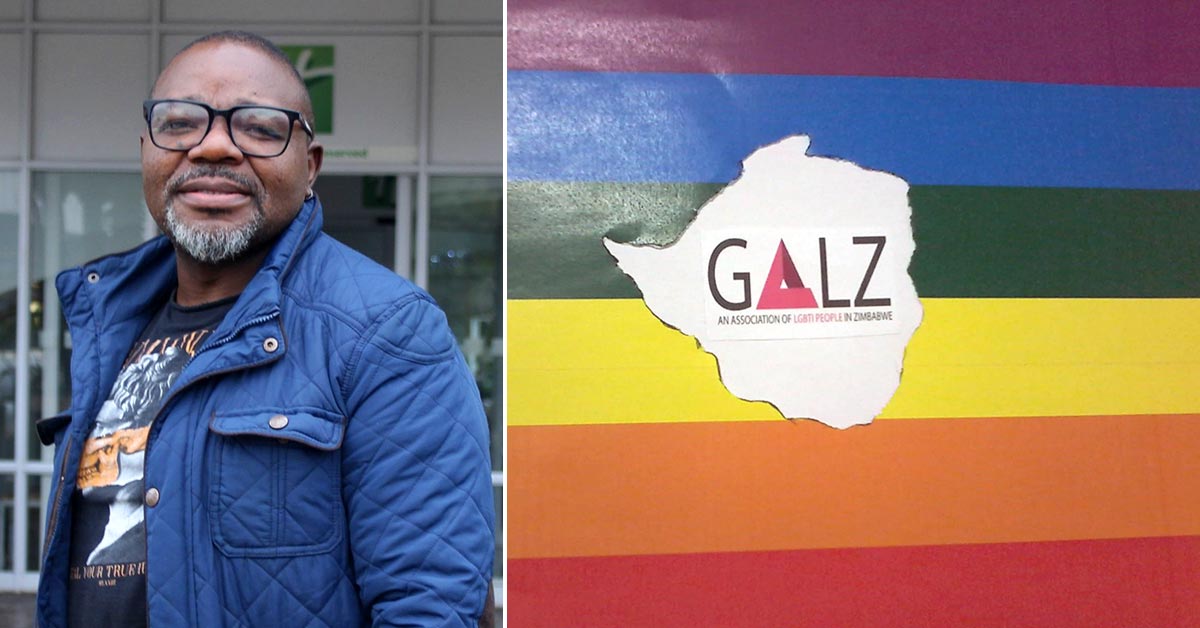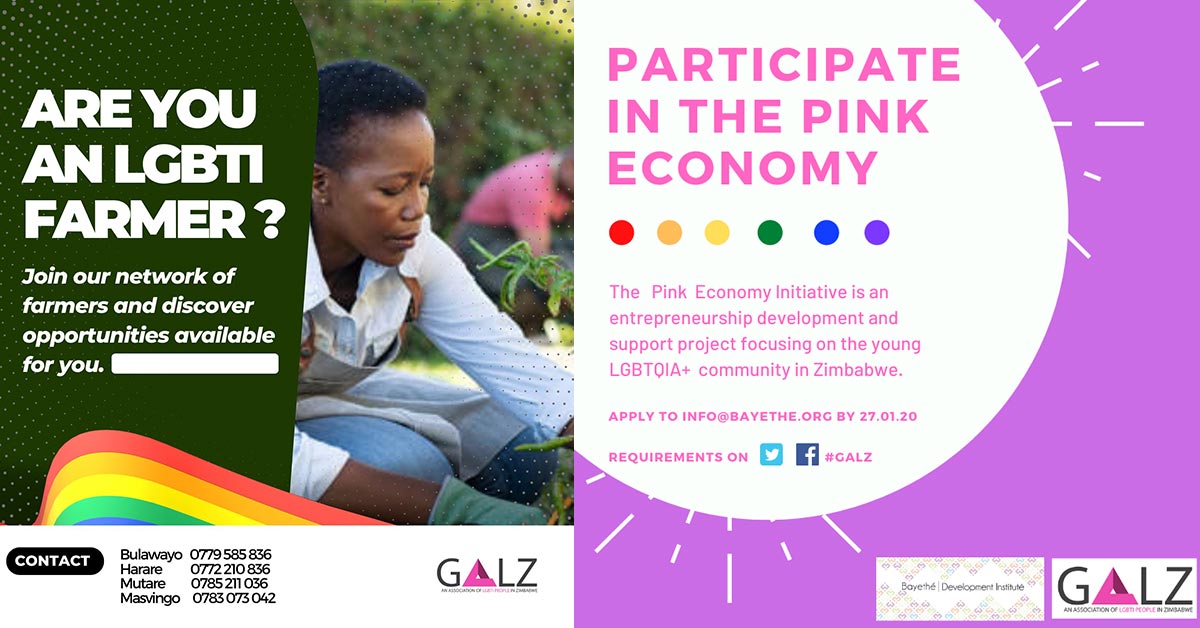GALZ: Forging the path to LGBTQIA+ economic development in Zimbabwe

GALZ’s focus over the next five years will be on LGBTQIA+ economic development, says Program Manager Samuel Matsikure
Zimbabwe has been wracked by economic instability for decades. What then are the options for LGBTQIA+ people who are often marginalised and excluded from the already limited employment and economic opportunities that do exist?
GALZ, said to be Africa’s oldest LGBTQIA+ organisation, was founded in 1990, with the mandate to promote, advocate and protect the livelihoods and interests of LGBTQIA+ people in Zimbabwe. In addition, the group provides HIV and health services to this community.
It does this despite historical incidents of harassment and abuse by the state, the continued criminalisation of homosexuality and political populism that has often painted a false picture of the LGBTQIA+ community.
In discussion with Samuel Matsikure, GALZ’s Program Manager, we learned that GALZ is now also set on addressing the exclusion of LGBTQIA+ Zimbabweans from the mainstream economy. But this is no easy task; not only because of decades of social stigmatisation but also the harsh economic realities facing the country.
According to the 2017 Situation Analysis Report of the Zimbabwe Congress of Trade Unions, the country has had a very fragile economy characterised by instability, which often led to shortages of the country’s currency and commodities.
In addition, the labour market had a record-high unemployment rate of 90.1%, causing many people to leave Zimbabwe to find better economic opportunities and asylum elsewhere.
“Many LGBTQIA+ children drop out of school due to bullying and stigmatisation”
“The era of Robert Mugabe led to homophobia, and through his campaigns, he ensured that the LGBTQIA+ community was discriminated against at every opportunity, especially in rural communities,” says Matsikure. “Thus, it became entrenched in all economic and political structures in Zimbabwe.”
Matsikure points out that the roots of economic LGBTQIA+ exclusion in Zimbabwe start at an early age, with many LGBTQIA+ children dropping out of school due to bullying and stigmatisation.
“When it comes to education, it becomes difficult because of the harassment and isolation by other children,” he says, adding that this continues into institutions of higher education. “Just two years ago, we did a campus climate survey that showed us that college and college students experience homophobia, discrimination, and stigmatisation from other students.”
Matsikure notes that the path to sex work is also a reality for many students as marginalisation forces so many of them to drop out of school. He also points to the many intersections of stigma.
“Women in Zimbabwe over the years have not received the same privileges as a boy, especially when it comes to access to education. And if they do not get access to education, that means they are already at a disadvantage in an environment that needs a highly skilled, experienced and educated workforce,” says Matsikure.
“And if you look at the current economic programmes that are offered either by the state or by institutions, they still think too much in [binary] gender categories. So, it affects different types of women or different types of people depending on their gender. So, you also find that LGBTQIA+ women experience double stigma and discrimination,” he explains.
Many economic opportunities in Zimbabwe are furthermore linked to party politics, says Matsikure. When they are made available, the LGBTQIA+ community is likely to be excluded. He also points out that LGBTQIA+ people are at risk of losing their jobs if they are open about who they are, a devastating scenario in a country that has limited employment opportunities.
A path to economic empowerment
According to Matsikure, the organisation’s focus over the next five years will be on economic development.
As part of its ongoing strategies to address economic inclusion and structural inequities, GALZ recently hosted its first Business Network Summit in partnership with the Bayethe Development Institute and The Other Foundation.
Although GALZ has been a key player in the fight against HIV/AIDS, frustration at the community being viewed only from a sexualised and medicalised perspective was evident through various statements made during the summit.
“We have a life to live, money to make, so give us empowerment programs,” GALZ counselling psychologist Badza told Pink Advocate.
The ground-breaking summit saw 35 people attending at the GALZ centre in Harare and 113 participating online in other provinces. Many members took to heart the urgent need for economic empowerment programmes.
The summit looked at issues such as the benefits of networking, and entrepreneurship, the importance of funding for LGBTIQA+ businesses, and access to skills in the pursuit of economic freedom.
“While there are some who have managed to start their own businesses, in an economy where everyone is a salesperson, it becomes difficult if they do not have the necessary training and skills or are not taught how to run a business,” says Matsikure.
GALZ is working on strategies that focus on building pillars to support and facilitate the inclusion of the LGBTQIA+ community in mainstream economic activities and employment opportunities, which includes empowering LGBTQIA+ individuals through training and business networks.
The organisation’s Pink Economy initiative, for example, equips LGBTQIA+ youth with skills such as leadership and business management and ongoing support for sustainable entrepreneurship. They are given access to safe working spaces, resources, and support services, as well as a support system involving mentorship.

GALZ has also introduced business network programs that support LGBTQIA+ farmers in obtaining more agricultural opportunities. This has included fish farming courses for would-be entrepreneurs, offering skills such as pond construction, stocking and management, marketing and market links, and disease control.
In a bid to start addressing the educational challenges faced by LGBTQIA+ youth, the organisation provides scholarships for higher education, specifically for excluded members of the LGBTQIA+ community.
“And anyone who approaches GALZ and wants basic education, we do not even ask them. We just say, ‘What school? And we directly pay funds there and monitor the individual to make sure they at least get a perfect education and know they can take care of themselves.”
Providing educational opportunities for these young people will also ensure that they can perform competently when negotiating in boardrooms, with government officials, businesses, and politicians, says Matsikure.
One of GALZ’s most successful approaches in the fight for human rights recognition has been the use of existing labour laws to support those facing workplace discrimination. The organisation is also ramping up efforts to educate and assist businesses in creating diverse and inclusive workplaces.
“So that’s the direction the organisation is moving in now, limiting the visibility of HIV and instead developing policies and integrating the conversation into different policy platforms and spaces,” says Matsikure.
The organisation believes that the LGBTQIA+ community needs to be brought to the table with politicians and decision-makers to influence policy. GALZ also affirms that at least 5% of the Zimbabwean economy should be pink money.
“A lot of African countries are saying ‘leave no one behind’ when it comes to achieving development goals. If you look at the history of Zimbabwe, where the economy has struggled, the discussion is all about economic growth,” says Matsikure. “And that growth must include LGBTQIA+ people.”
This article was made possible with the support of the Other Foundation and is part of a series addressing LGBTIQ+ Economic Empowerment in South Africa and the region. The views expressed herein do not necessarily represent those of the Other Foundation. www.theotherfoundation.org.
Leave a Reply